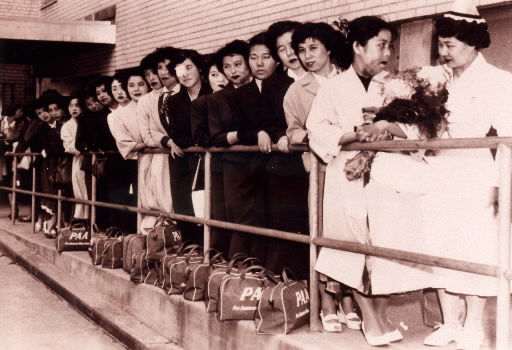Hiroshima Girls, Part 3: Half a Century After the Bombing [5]
Jul. 3, 2010
Wounds unhealed, women show reluctance to speak
by Masami Nishimoto, Staff Writer
This feature series on the "Hiroshima Girls," also known as "Hiroshima Maidens," is a close look at a number of Japanese women who were impacted by the atomic bombing of Hiroshima. The series was originally published in 1996.
The nursing home where she works, located in western Hiroshima Prefecture, commands a view of the Seto Inland Sea. Still active as a social worker, she has devoted her life to this career.
This August she turns 65. After several exchanges with regard to my request for an interview, she agreed to speak with me provided I would not use her name. This condition springs not from a desire to hide the fact that she is one of the "Hiroshima Girls." She explained, rather, that if she was thought to be seeking publicity, the impression would run counter to her intention, a situation she would find distressing.
At the time of the atomic bombing, she was 14 years old, a second-year student at Hiroshima Girls' School of Commerce. When the bomb exploded, she was near Tsurumi Bridge in downtown Hiroshima, about 1.5 kilometers from the hypocenter, helping to dismantle houses to create a fire lane. She suffered burns all over her body in the blast, and her mother and father, who drained the pus from her wounds day and night, encouraged her to survive, despite their own grief: "Don't let the bombing wound your heart, too."
"From my host mother and others, too," she said, "I learned to think about living life in a positive way and the fact that the real value of human beings does not lie in our appearance."
To undergo medical treatment, she lived in the United States for 13 months. When the time came to return to Japan, her host family, who were Quakers, gave her a Braille typewriter for the facility for visually-impaired children where she had worked, along with the good wishes: "Now do what makes you happy for the people around you."
"I chose this kind of work partly because, in my own way, I want to repay them for their kindness." She smiled shyly, her eyes wet with tears.
She obtained a high school degree through a part-time program at her alma mater, while working for a department store in Hiroshima. At the age of 27, she entered Meiji Gakuin University and majored in social work. Her host mother and others sent her 15 dollars a month, or 5,400 yen at the time, to provide for her school and living expenses.
Upon graduation, she became a social worker in her hometown. After a private nursing home for aging A-bomb survivors (hibakusha) opened, she worked there for 24 years. Last year, she moved to a similar facility, and has continued to work there.
High school girls in Tokyo visit the nursing home for peace education programs. When asked, she talks about her path which led from the day of the atomic bombing.
"My friends died, unable to even say goodbye to their families. Nothing is more tragic than death due to war. Even when the fighting stops, the pain does not heal." She expresses this view, and speaks about her experience as one of the "Hiroshima Girls," without embellishment. Her message is not strident. "It's not that I'm eager to speak out," she explained. "But I want my feelings to be conveyed to others. I guess many hibakusha feel that way."
The 17 "Hiroshima Girls" still living in Hiroshima Prefecture (some remain in North America) are all in good health. However, each time I inquired about conducting an interview, first by letter and then by phone, many responded: "I don't want to talk about the atomic bombing anymore…" A heavy silence fell between us and the pangs of exposure they endured as young women in the cruel, public spotlight seemed to burden their breathing.
One of the "Hiroshima Girls" continues to send Christmas cards, including cards on behalf of other "Hiroshima Girls," to those who loved them in the United States. Another, in place of those who speak out about their A-bomb experiences, writes letters of encouragement to students who have visited Hiroshima on school trips, listened to the A-bomb accounts, and sent notes to the speakers. Another shares her experience with her seven grandchildren.
Some "Hiroshima Girls," while holding fond memories of the people they encountered through the effort to provide treatment in the United States and carrying on in their spirit, refused the interview request, sometimes politely, sometimes adamantly. They were unwilling to even permit information in the articles that would enable others to identify them, including their ages and personal histories, as well as their names.
One woman said, "It took me 50 years to achieve an ordinary life. Even if I speak out, I can't recapture who I was before the bombing…" In a tearful voice, she continued, "We've had enough and we should be the last people to have to experience such feelings. That's all I want you to report." She then hung up.
The testimonies and the silence of the "Hiroshima Girls," who have survived the fate of Hiroshima, convey the deep scars that were inflicted on them by the atomic bombing and have not healed even half a century later. Only when people recognize the gravity of their experiences may the day come when these women volunteer to talk about themselves.
(Originally published on July 31, 1996)








